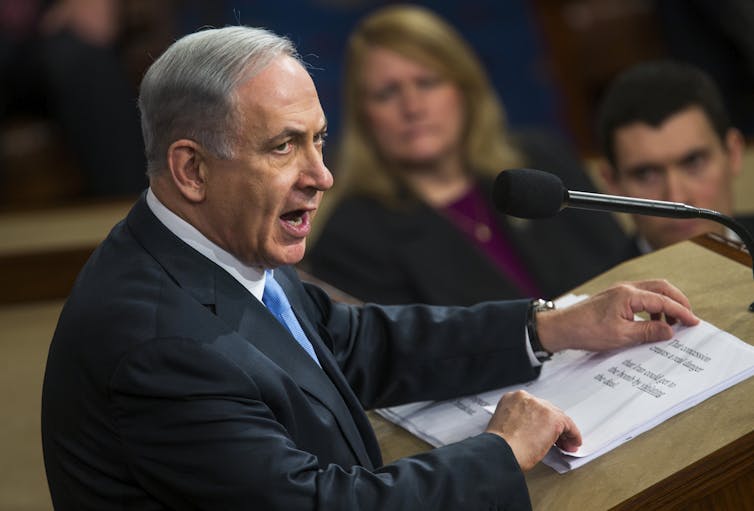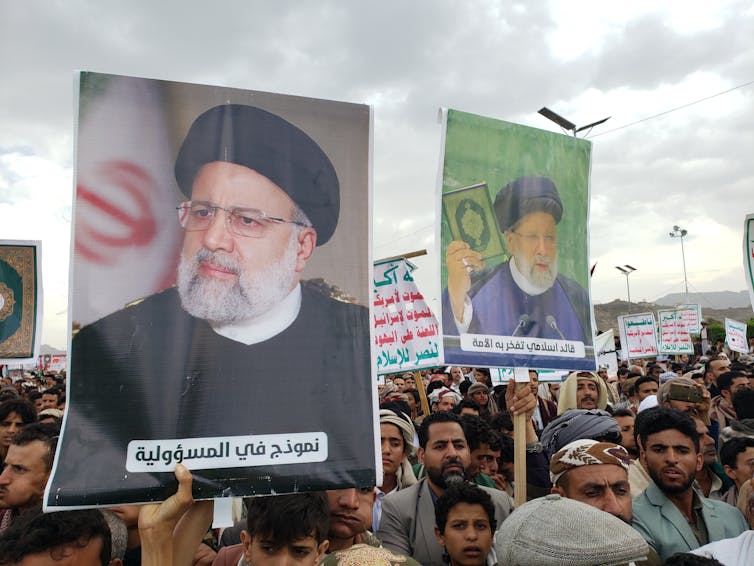The US president, Donald Trump, is weighing up whether to join Israel in attacking Iran. The fact he is even contemplating such a move is, in my opinion, a direct consequence of his 2018 decision to tear up the agreement negotiated during Barack Obama’s presidency that limited Iran’s nuclear capabilities in return for sanctions relief.
Trump not only squandered the opportunity to constrain Iran’s nuclear ambitions severely. He also shut the door on showing Iran that diplomacy and economic development could offer a more promising path than proxy warfare.
The Obama administration’s core strategic rationale behind the 2015 Iran nuclear deal, or joint comprehensive plan of action (JCPOA), was that amid several devastating regional wars and an American public weary of costly military interventions, a war with Iran would be disastrous. This was especially true given the growing US desire to pivot toward containing China.

Get your news from actual experts, straight to your inbox. Sign up to our daily newsletter to receive all The Conversation UK’s latest coverage of news and research, from politics and business to the arts and sciences.
Obama challenged opponents of the deal to propose a credible alternative. And Israel’s prime minister, Benjamin Netanyahu, addressed US Congress to make the case against the JCPOA. He argued that it would not prevent Iran from developing nuclear weapons.
But Obama ultimately succeeded in persuading the American public that the only real alternative to a negotiated agreement with Iran was yet another war in the Middle East.

Jim Lo Scalzo / EPA
Trump believed that exiting the JCPOA and crushing the Iranian economy would either force the regime to accept major restrictions on its nuclear programme and moderate its regional behaviour, or cause the entire theocratic system to collapse.
What followed instead was a sharp escalation of tensions in the Persian Gulf. Iran exercised greater reliance on its regional proxy network, with attacks on US personnel increasing. It simultaneously increased its stockpile of highly enriched uranium.
When Trump took office in 2017, the JCPOA had already eliminated 98% of Iran’s enriched uranium stockpile. It also capped enrichment at 3.7%, well below the level required for a nuclear bomb.
The situation has changed since Trump’s withdrawal. Israel’s central justification for launching its attack against Iran on June 15 was the International Atomic Energy Agency’s determination that Iran had now amassed over 408kg of uranium enriched up to 60%. Netanyahu claimed that Iran could be “within a few months” of producing a nuclear weapon.
However, even with these serious violations, US intelligence has consistently stated that Iran is not actively pursuing such a weapon. It recently assessed that, even if Iran decided to do so, it was up to three years away from being able to produce a nuclear weapon that it could deliver to a target of its choosing.
Netanyahu may have wanted to attack Iran anyway. He has repeatedly claimed over the past 15 years that immediate military action was needed to stop Iran from obtaining a nuclear bomb.
But it would have been harder to justify an attack on Iran if it possessed no highly enriched uranium and was verifiably complying with the JCPOA. Iran had stuck to the JCPOA for four years, including one year after the US withdrew, and there is no evidence to suggest it wouldn’t have kept to a deal that Iran clearly saw as being in its interests.
Maximum pressure campaign
Iran’s developing nuclear programme may be the immediate pretext for the current escalation. But Iran’s proxy warfare strategy, using regional militant groups to fight Israel and serve as pressure points it can activate when threatened, forms the other essential backdrop.
This strategy pre-dates the Trump administration. But Trump’s so-called “maximum pressure” campaign clearly escalated tensions in the Middle East, making direct confrontation between Israel and Iran more likely.
When Trump enacted sanctions aiming to eliminate Iran’s oil and gas exports, Tehran retaliated by using its strategic position in the Strait of Hormuz to harass Gulf shipping. In September 2019, an Iranian drone attack on a Saudi oil processing facility temporarily took out 50% of Saudi oil production.
Iran would normally have zero interest in disrupting Gulf shipping. This is because its own gas and oil must travel through the Strait of Hormuz. But its strategy was to deter Trump’s economic warfare by showing that it would not be the only one to suffer.
Tehran unsurprisingly viewed Trump’s policy as an attempt to deliver regime change and responded by doubling down on its “forward defence” strategy. Iran increased its military, financial and political backing of proxy groups in Iraq, Lebanon, Syria and Yemen. And it also continued development of its ballistic missile programme.
Before 2018, the US estimated that Iran was sending about US$200 million (£148 million) annually to the Lebanese armed group, Hezbollah. By 2020, it was sending US$700 million.

Yahya Arhab / EPA
Trump’s repudiation of the JCPOA also critically damaged more moderate voices in Iran. In 2017, the success of the JCPOA helped propel reformist president Hassan Rouhani to a second term in office. However, in 2021, the regime prevented key moderate figures from standing.
Ebrahim Raisi, a hardliner who had lost against Rouhani in 2017 and was already under US sanctions, was elected as Iran’s president. Raisi and his faction demanded tougher terms for any future nuclear deal – more sanctions relief upfront and binding guarantees against another US withdrawal.
This frustrated attempts to revive the agreement under Joe Biden’s presidency, as only Congress could offer such guarantees. This was an improbable prospect amid escalating tensions with a more hostile, nuclear-advanced Iran that was increasingly aligning with Russia.
None of this absolves Iran of its own intransigence, support for terrorism or brutalisation of its own citizens. Nor does it free the Islamic Republic of criticism over its decision to abandon the nuclear limits agreed under the JCPOA – even if it was the US that first broke the deal.
Ultimately, though, the conditions that led to this war would almost certainly not have arisen without Trump’s mishandling of Iran policy in his first administration. It was a precursor to the abysmal leadership he’s demonstrating in this war.




